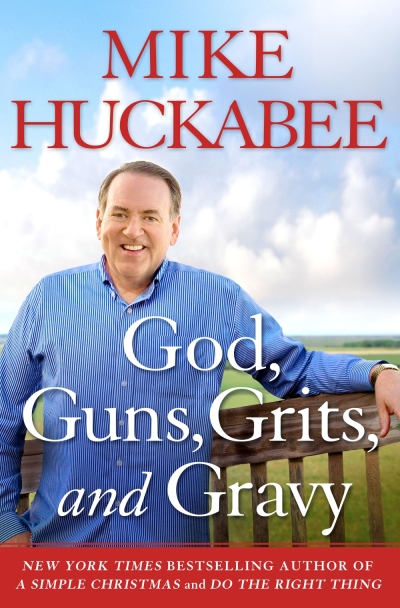Interview: Mike Huckabee on Common Core and Running for President (Part 3)

Common Core is a "good idea gone bad," Mike Huckabee wrote in his new book, God, Guns, Grits, and Gravy. He explained what he meant by that in a Monday interview with the Christian Post, and talked about his plans for a presidential run in 2016 and why he wrote the book.
He begins the book by recalling the Summer of 2012 Chick-fil-A protests over owner Dan Cathy's defense of biblical marriage. Huckabee helped to organize an August 1 counter-protest of sorts at the time called "Chick-fil-a Appreciation Day," which led to a 200 percent increase in sales on that day. Later, Huckabee said, he was disappointed in Cathy for saying he would never publicly defend biblical marriage again.
"For many who had stood for free speech in showing appreciation for Chick-fil-A, it seemed the company was choosing to abandon them and opt for 'no speech,'" he wrote.
The Chick-fil-a incident, along with similar incidents involving the Green family, owners of Hobby Lobby, and the Robertson family of A&E's "Duck Dynasty," demonstrate that there is a "great chasm," Huckabee wrote, between the "believes" and the "believe-nots."
"And, increasingly, the 'believes' in America have come to feel like cultural lepers — untouchables and undesirables — and an embarrassment to their fellow Americans who equate the holding of traditional views on marriage, religion, family, patriotism and even the rule of law and the Constitution with ignorance and superstition," he continued. "The snobbery and bold bigotry aimed at the 'believes' goes unchecked and unchallenged by 'believe-nots' who call themselves 'mainstream.' But such condescending attitudes toward people of faith are hardly mainstream in the geographical center of America."
In his CP interview, Huckabee said he hopes the "believe-nots" read the book so they can better understand the "believes," and he hopes the "believes" read the book so they will realize that they are not alone.
He also talked about his position on the Common Core State Standards Initiative, which has been controversial. Critics of Common Core have said that denouncing the federal involvement, as Huckabee has done, does not go far enough because there are problems with the standards themselves. In his CP interview, Huckabee said he is not specifically defending the Common Core standards but believes states should have high educational standards, and there are some benefits to having students in all states on the same track.
In part one of the interview, he talked about Evangelicals and divorce, and a controversial part of the book where he wrote about Beyoncé. In part two of the interview, he clarified what was meant by the phrase, "bend over and take it like a prisoner," in a chapter on privacy and airport security, and answered what he thought of the decision by some media outlets to censor Charlie Hebdo cartoons after the terrorist attack on the magazine's headquarters.
Here is a transcript, edited for clarity and length, of part three of that interview:
CP: You described Common Core as a "good idea gone bad," and wrote that you liked the standards but did not like the federal government involvement. Some of the criticisms of Common Core have been of the standards themselves, however. For just one example, a report last week argued that the Common Core K-3 standards fail to understand how children learn in those early years, and a statement signed by over 500 early childhood professionals said that the standards are not appropriate for those early years. Why are you confident that the standards are good standards when some experts have said they are not?
Huckabee: I wouldn't defend the specific standards. What my point was, and remains, is that we should create higher standards, not lower ones. That we should try everything to ensure that our schools are not dumbed-down.
Look, the way it's supposed to work is that the states are in control of the standards. If they don't think that they are age appropriate, then, if they are under the control of the states, then they'll change them, they'll make them better. Which is the way it ought to work. That's nothing different than what I've always believed.
It's not that I'm defending specific standards, in terms of, "you have to know this by a certain age." What I'm defending is that states ought to have a standard. I'm really concerned that if the option is to have high standards or no standards, gosh, I hope we don't go to the place where we don't want a standard, that we don't ever want to hold kids to the highest possible level of accountability.
Does it need to be regularly reviewed and assessed and revised? Well of course. That's the whole point of keeping it under the control of the locals and not letting the feds take it over.
CP: Even without federal government involvement, should there be an attempt to have some uniformity between the states? Is there an advantage to having states, or groups of states, all having the same standards, or does that matter?
Huckabee: The word "uniformity" scares me a little because that would appear to be "sameness." But here's what needs to happen: A child who completes the fourth grade in math and language arts in Oregon, if that child moves to Georgia the next year, that child's academic perspective ought to be comparable to what he or she was involved in the year before. If the child makes that move, geographically, and the child is ahead of his peers, or a year behind his peers, clearly now you've created a problem in that the standards are not the same.
How do you, say, play basketball, if in one part of the country the goal is 10 feet from the floor, but in other parts of the country they've lowered it down to six, that way all their kids can slam dunk the ball. Are the kids shooting the ball at six feet off the floor playing the same game as the one's shooting at 10 feet off the floor? Are they being judged by the same standard? Do we really know how they're playing the game if they're playing it against an entirely different standard? And the answer is, of course not. So, whether it's in sports or music or business, there needs to be a standard by which you can say, "here's how the game is being played, here's how well it is being played." And that's why I think there needs to be, it doesn't have to be uniformity per se, but there's got to be some clarity.
The reason that many of us as governors fought strongly for state control is we didn't want the federal government coming down and putting one standard and saying this is it, because then it becomes a fixed standard, which is what happened when they started tying in the Race to the Top funds.
What it should have been is, states will control it, states will decide. And one thing I can certainly attest to, having been a governor for 10 and a half years, if a governor feels that his or her state is getting behind, they will do what they can to try and improve it, and if they are being evaluated in comparison to other states, the worst thing that can happen and what they want to try and avoid is being compared unfavorably and told that they're ranked 50th in anything.
CP: You recently left your Fox News show because you haven't decided whether you will run for president. When you wrote this book, was it at the back of your mind that the book might serve as an introduction to a Huckabee candidacy?
Huckabee: In order for me to take the next logical step to run, I clearly had to sever the relationship with Fox so that I could openly talk to people about running, which I couldn't do as long as I had an employment contract there.
So it was very difficult to leave, and something that was not easy, because I love doing the show, love the people I work with, nothing but extraordinary respect for people like Roger Ailes, who have created an enormously successful network.
But there came a point where I realized that my own comfort level doing the show and having that platform and the compensation that came with it, as important as that was, it still wasn't as important as, maybe this is the time for me to step up and offer leadership to the country.
CP: How is that search process going, as far as deciding whether you want to pursue running for president or not?
Huckabee: Very favorably and very positively. Until two and a half weeks ago, I really wasn't able to go to someone and say, "if I run will you help me," because that would have crossed that line that I couldn't cross. Now I can honestly say that and it's very clear that there is strong support and I'm very encouraged by it.
CP: Anything else you would like to share with our readers?
Huckabee: There are two things that I hope come from [the book]. The people coming from what I call the "bubbles" of New York, Washington [D.C.] and Hollywood, I hope they read the book and finally get to understand some of us who live over in the fly-over country, people who live in "Bubbaville" rather that "Bubbleville." But I also hope that the people who live in the land of "God, guns, grits and gravy," the people in the fly-over country, I'm hoping they read it. They will feel a sense of affirmation. They will be able to look and say, "we're not alone, there are lots of people like us and we're okay." I really think that's part of what will happen.




























